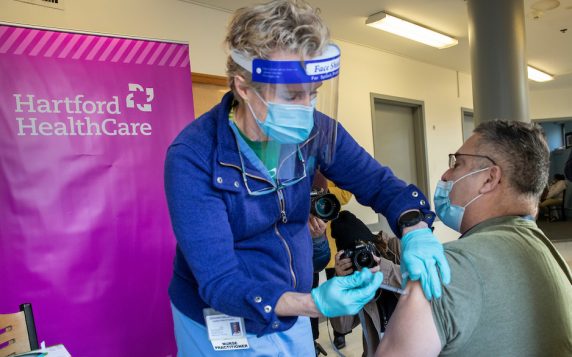COVID-19 isn’t always a hit-and-run virus. Sometimes it lingers for weeks and months as long COVID, with the Centers for Disease Control and Prevention now estimating it affects 35 percent of people infected.
“Chronic headaches, new-onset diabetes in people who had normal blood sugars before,” says Dr. Jo-Anne Passalacqua, an Infectious Disease Specialist at St. Vincent’s Medical Center in Bridgeport.
And that’s only a sampling of symptoms. Heart problems, brain fog, difficulty breathing, fatigue, mood changes and sleep issues are routinely reported as post-COVID symptoms. One study even linked COVID-19 to a slight shrinkage of the brain after infection.
“The data on long-haulers is rather alarming,” says Dr. Passalacqua.
An analysis last year published by the Journal of the American Medical Association found these symptoms the most common among people suffering from long COVID:
- Chest-imaging abnormalities (in 62.2 percent of patients).
- General functional impairments (44 percent).
- Fatigue or muscle weakness (37.5 percent).
- General pain (32.4 percent).
- Generalized anxiety disorder (29.6 percent).
- Sleep disorders (27 percent).
- Difficulty concentrating (23.8 percent).
“After one recovers from COVID,” says Dr. Ulysses Wu, Hartford HealthCare’s System Director of Infection Disease and Chief Epidemiologist, “I want to be cognizant of the fact that besides cardiopulmonary issues, which may be contributing to something like high blood pressure, there are also a lot of psychosocial aspects as well as long COVID that we still need to figure out exactly what it is about.”
Kelly Martinez, 21, of Bridgeport is still using a portable oxygen tank 18 months after recovering from COVID-19.
“Now I can move around and I have a lot more ability without my oxygen dropping,” says Martinez, a student who hopes to become a nurse. “That’s good news. But they don’t know how long it will last or if this is long-term or temporary. They’re hoping it’s just something temporary.”
Children are also vulnerable to long COVID, with 25 percent developing symptoms that lasted one to four months or new, persistent symptoms that appeared within three months, according to research posted March 14 on medRxiv.
Researchers, who pooled data from 21 studies in Europe, Asia, Australia and South America, noted these symptoms:
- Neuropsychiatric: Mood symptoms, fatigue, sleep disorders, headaches, cognitive alterations, dizziness and balance problems.
- Cardiorespiratory: Breathing difficulty, congestion, exercise intolerance, chest pain and tightness, cough and irregular heart rhythm.
- Skin-related: Excessive sweating, itchiness and hair loss.
- Gastrointestinal: Abdominal pain, constipation, diarrhea, vomiting and nausea.
“You think it can’t be you,” says Martinez, “but in reality it can. Your life can turn in a switch.”
If you’re experiencing long-term effects of COVID-19, schedule a virtual visit or in-person appointment with Hartford HealthCare’s COVID Recovery Center. For more information, call 860.827.3200 or click here.




